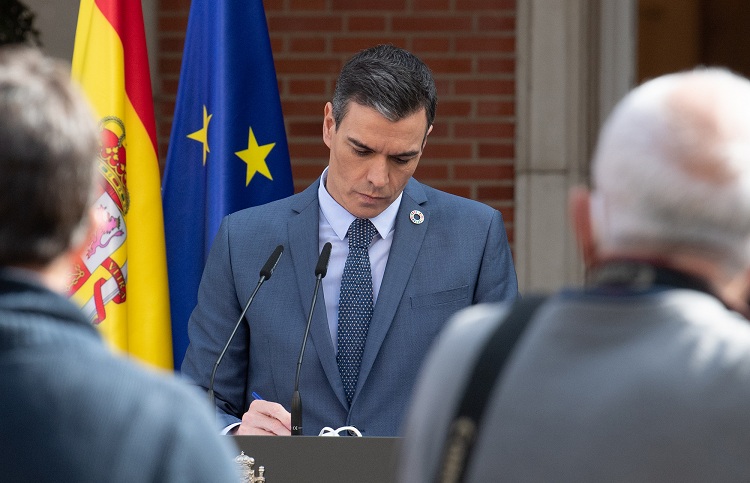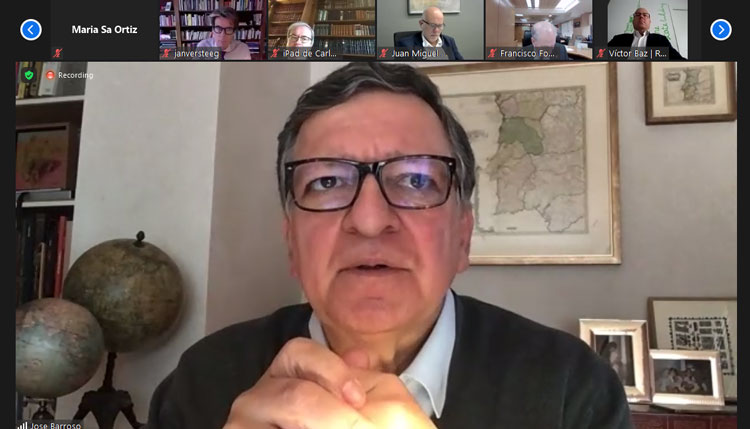Eduardo González
The President of the Government, Pedro Sánchez, has insisted before the rest of the European leaders that the EU must improve its capacity to produce its own vaccines against COVID-19 in order to guarantee “greater autonomy” and greater security “in supply” and has called for “a European agreement” on the vaccination certificate that will help to “recover normality and tourism as soon as possible without increasing the health risk”.
The head of the Spanish government has been participating in a two-day European Council meeting since Thursday, via videoconference, during which the leaders of the EU-27 tackled three major issues: the fight against COVID-19 (on Thursday), defence and security, and the southern neighbourhood (the latter two were dealt with yesterday). At the end of the meeting, the Council adopted a declaration in which, with regard to the pandemic, Member States defended the need to maintain mobility restrictions for non-essential travel and committed themselves to “increase capacity for the current production of vaccines” in Europe and to seek “a common approach” on vaccination certificates.
“Three days ago, together with other EU prime ministers – Denmark, Belgium, Poland, Lithuania – I signed a letter in which we asked the President of the Council and also the European Commission and the other Member States to develop a strategy to increase our vaccine production capacity in the short and medium term”, Pedro Sánchez declared yesterday at the press conference following the Council. For this reason, the head of the Spanish government welcomed the “unity” of the 27 Member States on this proposal, because the development of these capacities “will allow us in the future to have greater autonomy and also a certain security in the supply of vaccines in Europe”.
Likewise, he continued, the European Council debated “mobility within the EU, which is fundamental, especially for countries like ours, so dependent on the good functioning of the tourism sector”, and he welcomed the fact that, “after several European Councils, there is finally agreement on the need to maintain restrictions on non-essential travel, but always within a balance that does not hinder the free movement of goods and services and respects the internal market”. “As Spain has been defending, the importance of the principle of proportionality and non-discrimination in the application of the measures has been strongly emphasised”, he added.
Likewise, he explained, “a debate has been opened on vaccination certificates, which we believe cannot be postponed, as they are so important for countries as dependent on tourism as ours is”. According to Sánchez, “an agreement has now been reached, at last, at a technical level, at European level, on the minimum common data that the certificate must contain for medical use”, but “we must promote a debate as soon as possible”. “Spain is doing so, and has been doing so from the outset, on the possible future uses of these certificates as laissez-passers or mobility passports”, he said.
“The objective, in the view of the Spanish government, would be clear: to restore normality and tourism as soon as possible without increasing the health risk”, he continued. “In order for these certificates to have an effect beyond their health use, a European agreement is needed” because “I do not think we should be satisfied with unilateral or bilateral solutions, and that is why we want to address this issue openly, both within the EU and in other multilateral forums”, he concluded.
The vaccination certificate was proposed by Greece and has the support, above all, of the southern European countries most dependent on tourism, such as Spain, Italy, Malta, Cyprus and Portugal. On the other hand, France, Germany, Belgium, the Netherlands and Luxembourg, which fear that it could discriminate against people who have not yet been vaccinated in the summer, are reluctant to support it, while in the Nordic countries, especially Denmark and Sweden, there is a growing movement in favour of the certificate.
Sources from the Ministry of Foreign Affairs have specified that, following the Council’s decision to open the debate, “very intense talks” on this issue are expected “throughout March” within the EU. They also assured that the government is confident that the period for the implementation of the vaccine certificate system will be completed within three months at the latest.







